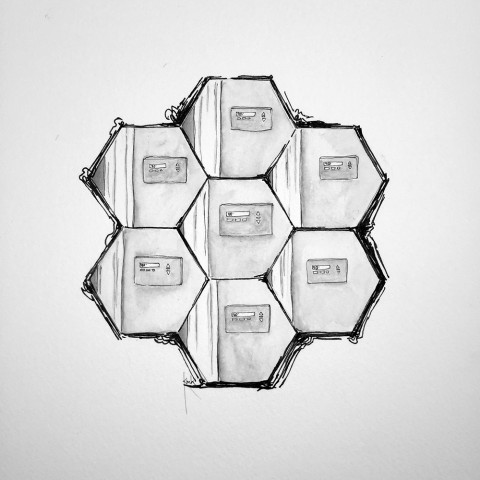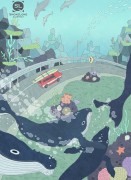I call my brother because of the wasp in the kitchen. My brother is an entomologist. He spent six years of his life refrigerating caterpillar larvae. He greets me on the phone, listens to my predicament, and says: “Pete, I understand. Your fear is justified. People have gone into anaphylactic shock after being stung by a wasp.” He speaks softly, like I’m six and not thirty-four.
This is why I didn’t call my wife. She would’ve reminded me: “Pete, you’re thirty-four.”
That’s one of the differences between marriage and brotherhood. When you’re married, you age.
The wasp perches on the fire sprinkler. It surveys my apartment through the honeycomb vision of compound eyes. It examines multiple versions of me huddled in a corner, holding a rolled-up yoga mat like a baseball bat.
I ask my brother his thoughts on industrial death spray.
He says, “Pete, you know that saying: Don’t shit where you eat…”
“Yeah.”
“I’m pretty sure it applies to poison too.”
I ask what the chances are that the wasp is a queen laying eggs as we speak.
He says, “Remember that movie, Aliens?”
Growing up, my brother and I watched Aliens religiously. Whenever I had a stomachache, I’d imagine a bluish-black fetus burrowing though my intestinal lining.
He says, “Remember the queen?”
“Yeah.” The queen was the size of a T. rex.
“So is it a queen?”
I squint at the tiny dot on my fire sprinkler. “No.”
My brother segues to the topic of Japanese honeybees. He starts talking about how Japanese honeybees defend themselves against wasps by swarming the enemy and vibrating their wings, raising their collective body temperature to 116 degrees. Apparently, wasps incinerate at 115 degrees, while honeybees can withstand temperatures up to 117 degrees. So there exists one degree of safety. One degree where the honeybees’ problems simply melt away.
I walk over to the thermostat and inform my brother that it stops at 95 degrees.
He says, “That’s not the point.”
“What’s the point?”
“Victory has a precedent.”
I tighten my grip on the yoga mat. I feel warm. Perhaps a fever. Perhaps hope.
He says, “Pete, in your case, it’s a war of attrition. Both you and the wasp require an energy source to produce ATP; otherwise, your cells will suffocate. As long as you acquire an energy source in the next two days and the wasp doesn’t, you have nothing to fear.”
I tell him there’s some trail-mix in the bedroom.
He says, “There you go.”
We stay on the phone. We both have time to kill. My brother is stuck in traffic on I-95. The cells of the wasp on my sprinkler won’t suffocate for another 48 hours.
My brother asks about the Washington Redskins—if our football team will ever return to their former glory.
I say, “Definitely. Fortune’s a wheel. Hasn’t Pat Sajak taught you anything?”
I ask about global warming—if there’s a scenario where humanity doesn’t turn Earth into Venus.
He says, “Pete, the sun is a naturally occurring nuclear reactor. If we can learn to harness its power, everything should work out.”
I repeat the word “if” the way Sam Waterston says “objection” on Law and Order.
My brother repeats: “When, when, when…”
The conversation goes from there.
He asks me about God.
I give my best defense of deism.
I ask him about our father’s health.
He emphasizes the low mortality rate of prostate cancer.
We continue like this for another ten minutes or so, in search of that one degree where all our fears will be liquefied. The words we use, our tone of voice—everything is calculated, deliberate. It has to be. One stutter or wrong question and we melt.



 Included in the price of SmokeLong Fitness:
Included in the price of SmokeLong Fitness: